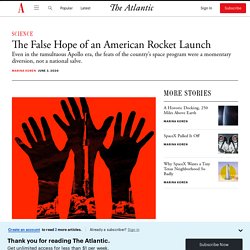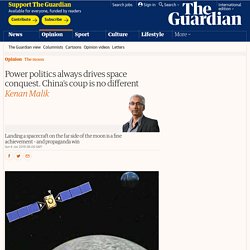

The False Hope of an American Rocket Launch. Adam Serwer: Trump gave police permission to be brutal Charles Bolden Jr., the former NASA administrator under Barack Obama, drove from Virginia to Cape Canaveral to witness the launch.

Bolden, the first African American to lead the space agency, didn’t stick around for Trump’s speech, but he caught some of it later, including the president’s call for unity. “I found it ironic that that was the president’s theme when half the problem is him,” Bolden told me on a call during his drive back home. “You can’t unify the country when the country doesn’t have a unifying leader.”
In 1968, Bolden was a young graduate of the U.S. Half a century later, the American space program looks quite different. Unlike the Apollo program, the Trump administration’s moon effort—named Artemis, for Apollo’s sister in Greek mythology—is struggling to get the budget it needs, and remains a long shot. The SpaceX launch drew several million viewers. Adam Serwer: Trump gave police permission to be brutal.
La Chine démontre sa puissance spatiale en se posant sur la face cachée de la Lune. La Chine faisait déjà partie du cercle très fermé des principales puissances spatiales : capable comme les États-Unis et la Russie d'envoyer des humains dans l'espace de manière autonome, depuis 2003.

Mais sa réussite historique sur la face cachée de la Lune a confirmé comme jamais début 2019 les ambitions du pays qui se voit première puissance spatiale mondiale en 2045. Malgré un budget opaque estimé à 8,4 milliards de dollars en 2017 par l'OCDE contre 40 milliards pour le programme civil et militaire américain. Et la pandémie de Covid-19 n'empêche pas la Chine de marquer à nouveau sa différence ce mardi avec un troisième alunissage.
Après déjà, au coeur de l'été, le lancement réussi d'une sonde inhabitée à destination de Mars. Au-delà de ces symboles au très fort impact médiatique, l'objectif du programme spatial chinois, géré par l'Armée populaire de libération (APL), demeure terre à terre : accompagner le pays dans son essor économique et sa volonté de souveraineté. Objectif Lune. Chine : rivalité spatiale avec les Etats-Unis. La Chine, dont le programme spatial est géré par l'Armée populaire de libération (APL), envoie aujourd'hui plus de fusées en orbite que n'importe quel autre pays - 39 en 2018, contre 31 américaines, 20 russes et... 8 par l'Europe.

Elle vient de faire alunir un véhicule sur la face cachée de la Lune (une première historique), va construire une station en orbite terrestre dans les années 2020, et veut qu'un "taïkonaute" marche sur la Lune dans la décennie suivante - il serait le premier Homme depuis 1972. Aucun Russe n'y est allé. Dépenses records Le pays dépense plus que la Russie et le Japon pour ses programmes spatiaux civils et militaires. Le budget chinois, opaque, était estimé à 8,4 milliards de dollars en 2017 par l'OCDE. Commercialement, les fusées chinoises ne menacent pas le marché du lancement de satellites, dominé par SpaceX aux Etats-Unis. Vers des loi spatiales ? Here are eight ethical questions we should be asking about exploring outer space. Space exploration - latest news, breaking stories and comment - The Independent. Power politics always drives space conquest. China’s coup is no different.
Nasa rejected it as too difficult and costly an undertaking.

Last week, China declared “mission accomplished” after landing a spacecraft, Chang’e-4, on the far side of the moon. It was a remarkable endeavour. As the far side of the moon never faces the Earth, mission control cannot communicate directly with the spacecraft, but only via an orbiting satellite. The terrain is more broken and cratered than the near side, so landing a craft is that much more difficult. Even Nasa was impressed: “a first for humanity and an impressive accomplishment!” Yet mixed with admiration was trepidation. “The Soviet Union has made this a test of the system,” President Kennedy told a meeting on Nasa funding in 1962.
From the beginning, the space race was intimately bound up with the needs of the cold war. Where Russians exulted, Americans despaired. The answer, the two men decided, was a manned moon landing. America barred China from participating in the International Space Station (ISS). Is It Worth It? the Costs and Benefits of Space Exploration.
Ever since the Sun set on the Apollo era and the Soviet Union collapsed (thus ending the Cold War), there has been an unavoidable question when it comes to space exploration.

It has become even more relevant in recent years in response to new proposals to send astronauts to the Moon and to Mars. "Given the sheer cost, is space exploration really worth it? " Let's face it, space exploration isn't exactly cheap! It takes the equivalent of millions of dollars to send even a single robotic mission to space, and billions of dollars to send astronauts to orbit. If you're looking to send explorers to even the nearest celestial bodies, chances are the costs will run into the hundreds of billions. To be fair, exploring space, the other celestial bodies of the Solar System, and the Universe at large also comes with innumerable benefits. What About Earth? For those debating the worth of space exploration, things often turn towards the issue of how many problems we have here on Earth.